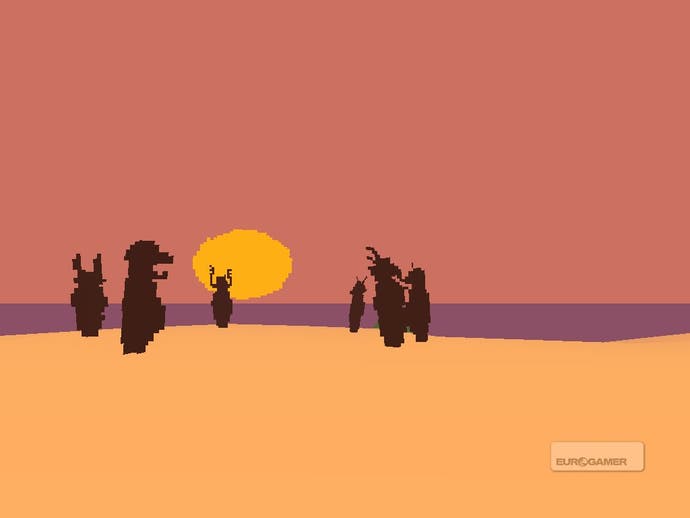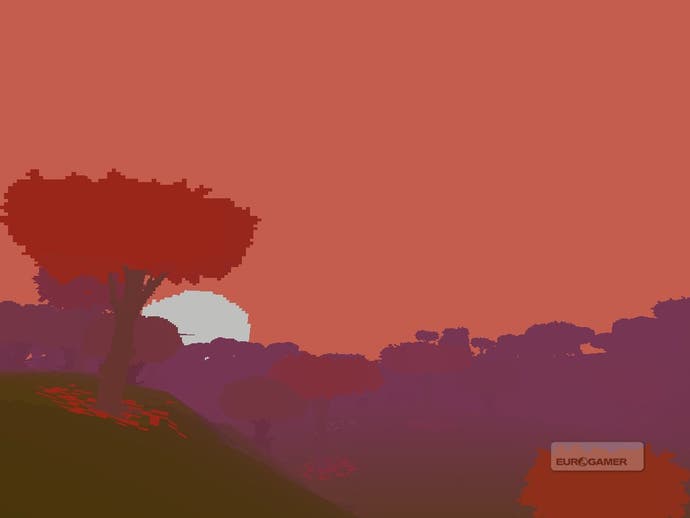Proteus Preview: A Musical Odyssey
In a beautiful place out in the country.
I had a friend who had synaesthesia. Sounds would form a iridescent fog over her vision, with different sounds creating different colours, and multiple sounds layering over one another; blue could be shot through with silver, or pockets of red would flare in a brown malaise. Most of the time, she said it was actually quite pleasant, as though she was seeing an extra layer to sound that was unique to her. Most of the time, it made her feel special.
Sometimes, when there was too much sound, or too many that conflicted, it would overwhelm. It would make it difficult to see, and difficult to think, with this violent storm of colour covering everything. It was only at those times that she ever claimed to 'suffer' from synaesthesia.
Proteus, a procedural exploration game by Ed Key, doesn't let you see what you hear. It lets you hear what you see.

Trees have a low bass that takes you by surprise the first time you hear it, but provides a steady musical bed for the higher melodies of fireflies and flowers, or the sudden tinkle and upwards cadence of a hopping rabbit. Synths and beats are laced throughout the entire island that the game generates specifically for you, layering all these sight-sounds over them, so that you have a constant aural texture building and building.
You break from the canopy of the woods, and the tone changes instantly. Without those bass notes everything feels suddenly more open, not nearly so constrained. Wheat fields and daisies have their own notes, too, but they can't match the power and majesty of the trees, or equal the spritely staccato of the animals. They have their own place, and their sound is more delicate, but just as pretty. They're worth visiting.
Playing the unfinished preview build, Proteus feels surprisingly complete, not least because the main structure of the game, where you move through the seasons from spring to winter, is fully in place. Each season has its own wildlife, and its own music, both the synth bed and the tones of vegetation and animals changing to match the march of the year.

And while you can't actively interact with anything in the world, the construction of melody and sound is enough. It's enough to know that you can go down to that clearing and change Spring to Summer, Summer to Autumn, Autumn to Winter, at any time. It's enough to wander over to a frog and watch it hop away, each movement soundtracked with an electronic buzz. You don't need to pick anything up, or solve any puzzles, to feel involved in a world.
That's the wonder of Proteus, as it stands. That this is a world that feels alive, and it feels as though you're a part of it. It doesn't matter that this is a bespoke island created just for you, or that there's a house with no occupant, or a field of gravestones without any explanation. It's enough to just wander, and have the world sing to you. But it's so much, so constantly, that it threatens to overwhelm. The sounds flood your ears as you drink in the sights, and you can get lost in it all. The seasons, each with their own distinct feel, build a narrative that is bitter sweet at best.
Right now, Proteus is a beautiful, wonderful game. It's unique, and it provides an experience that is quite unlike anything I've come across before. The more that gets added to flesh out these pocket worlds that the game creates for you can only to the majesty of it all. Ed Key, the developer, talks about the game in terms of EPs and LPs, as if they were musical records, and if this is the EP, the small collection of songs that lead into the release of a full blown album, then consider me well and truly teased.
I can't wait to hear it.

